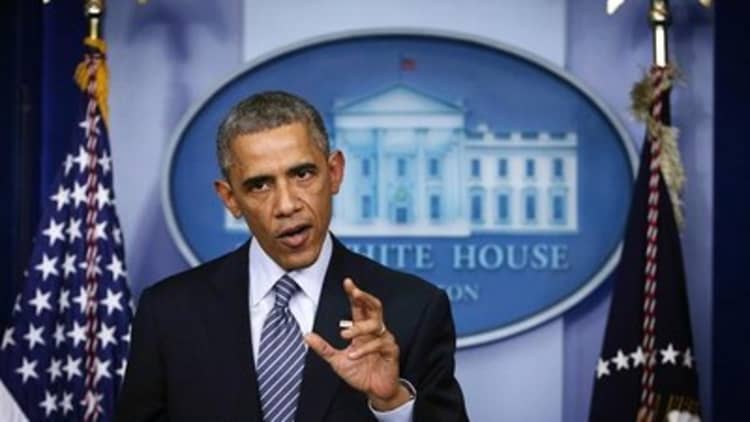
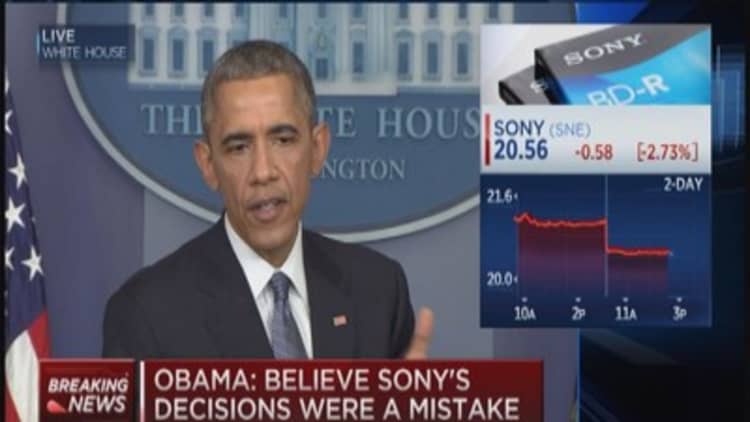
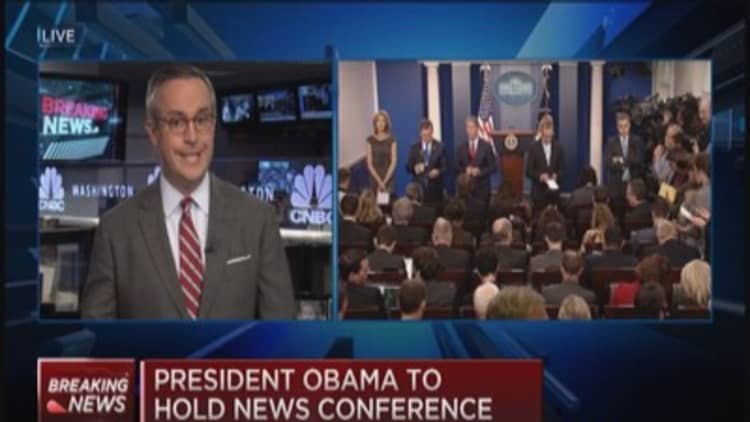
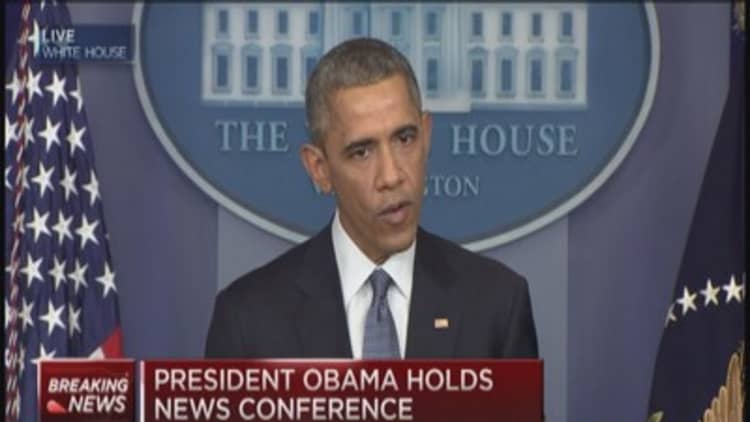
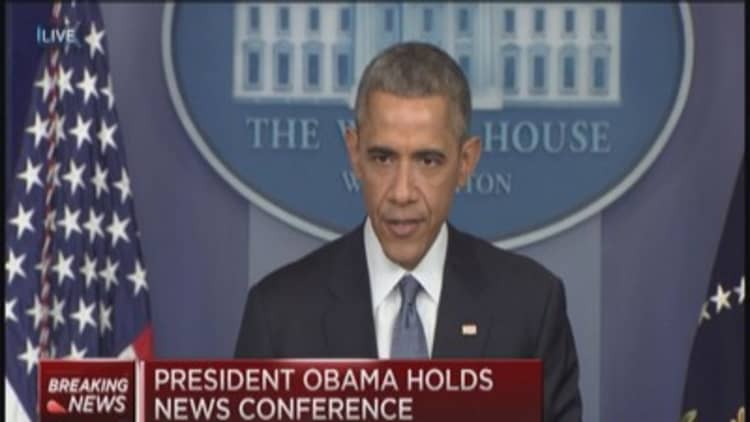
President Barack Obama said Friday that Sony should not have pulled "The Interview" after a North Korean hacking, and he pledged to answer the attack. "We will respond," he told reporters.
"Sony's a corporation. It suffered significant damage, there were threats against its employees," Obama said at his annual year-end news conference from the White House. "I am sympathetic to the concerns that they faced. Having said all that, yes, I think they made a mistake."
He added that he wished "they'd spoken to me first," so he could tell them not to set a bad precedent by caving into hackers' threats. He explained that this could eventually lead to self-censorship if the media did not want to offend "somebody whose sensibilities probably need to be offended."
Read More
"Let's not get into that way of doing business," the president said.
For its part, Sony Entertainment denied that it had caved, with CEO Michael Lynton telling CNN that "the President, the press, and the public are mistaken as to what actually happened."
"I don't know exactly whether [Obama] understands the sequence of events that led up to the movie not being shown in the movie theaters," Lynton told CNN after explaining that theaters had first declined to show the film. "Therefore I would disagree with the notion that it was a mistake."
Obama also emphasized in his Friday speech that the U.S. will retaliate in some way against North Korea—which the FBI fingered as the attacker earlier Friday.
Read More The one smart way to retaliate against North Korea
"They caused a lot of damage, and we will respond. We will respond proportionately, and we will respond at a place and time and manner that we choose," he said.
The president declined to say if he had ruled out military force against North Korea, or if his administration was considering economic penalties. He did confirm, however, that U.S. investigators did not have any indication that the attack was coordinated with another country.
Still, Obama said that it "says something interesting about North Korea" that the country launched an assault because of "a satirical movie starring Seth Rogen and James Flacco [Franco]."
As 2014 draws to a close, Obama had much to discuss. The president's domestic agenda varied this year: He spoke out repeatedly against so-called tax inversions, continued the health-care reform rollout, and took executive action on immigration law.
But international events have also occupied much of his attention, including violence in Ukraine (and resulting sanctions on Russia), an outbreak of Ebola in West Africa and the rise of the Islamic State of Iraq and Syria (ISIS). Obama even announced earlier this week that the U.S. would normalize relations with Cuba.
Read More
Obama reflected on that decision, saying he shares "the concerns of dissidents there and human rights activists that this is still a regime that represses its people."
"I don't anticipate overnight changes, but what I know deep in my bones is that if you've done the same thing for 50 years and nothing's changes, you should try something different if you want a different outcome," he said.
Obama declined to offer any specific goals for the U.S.-Cuba relationship, but he said that "change is going to come to Cuba—it has to."
Still, Obama predicted that disagreements may well arise between Havana and the U.S. government.
Read More
"The whole point of normalizing relations is that it gives us a greater opportunity to have influence with that government than not," he said, adding "I wouldn't be surprised if they take, at any given time, actions that we think are a problem."
The president predicted a healthy debate on lifting the embargo on Cuba, but admitted that he did not foresee visiting Cuba or President Raul Castro coming to America anytime soon—he did say, however, that he could envision one day traveling to the country.
Beyond the Cuba announcement, the past few weeks also saw protests break out across the country over police violence and race relations.
On that subject, Obama referenced "a growing awareness in the broader population of what many communities of color have understood for some time." That awareness, he said, is that law enforcement does not "feel as if it's being applied in a colorblind fashion."
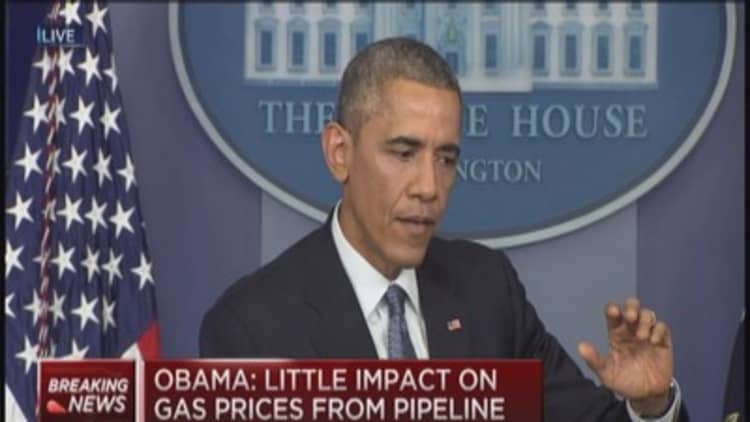
Obama also addressed the proposed Keystone pipeline, saying there would be "nominal impact" on U.S. gas prices if the project went through. On the subject of the American energy sector, however, the president struck a positive note, boasting America's role as the No. 1 producer of oil and natural gas.
Read More Economics no longer make Keystone pipeline viable
The overall economy should be celebrated, he said at the opening of his address.
"Pick any metric that you want: America's resurgence is real. We are better off," Obama said. "I've always said that recovering from the crisis of 2008 was our first order of business. And on that business, America has outperformed all of our other competitors."


